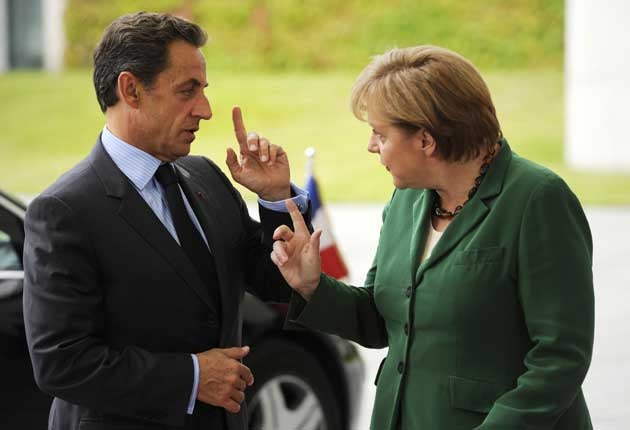Sarkozy and Merkel propose eurozone government

All countries that use the euro should have mandatory balanced budgets and better coordination of economic policy, the leaders of France and Germany said today, pushing for long-term political solutions instead of immediate financial measures like a single European bond.
French President Nicolas Sarkozy and German Chancellor Angela Merkel also pledged to harmonise their countries' corporate taxes in a move aimed at showing the eurozone's largest members are "marching in lockstep" to protect the euro.
Both leaders stressed their commitment to defending the common currency, a cornerstone of integration on this long-fractured continent. They presented their proposals after meeting today in Paris amid signs of economic slowdown, and after an exceptionally turbulent week on financial markets prompted by concern about Europe's financial health.
Sarkozy told reporters that he and Merkel want a "true European economic government" that would consist of the heads of state and government of all eurozone nations.
The new body would meet twice a year — and more in times of crisis — and be led initially by EU President Herman Van Rompuy for a two-year term. After that, Sarkozy suggested, it could be opened up to other heads of states and government.
The move appeared a step toward the closer long-term economic integration that many analysts have said is inevitable to make the euro experiment survive, though it was unclear how much effect it would have in the short term.
"There has to be a stronger coordination of financial and economic policy" to protect the euro, Merkel said.
The chancellor stressed that the crisis built up over several years by the actions of several member states, and there is no solution to tackle the crisis within days now.
"We will regain the lost confidence," she said. "That is why we go into a phase with a new quality of cooperation within the eurozone," she added, referring to the proposal of forming a permanent economic government for the eurozone.
The two leaders ruled out, however, issuing common government debt in the form of eurobonds, at least for now, despite demand by many investors for such a bold but politically difficult move.
AP
Join our commenting forum
Join thought-provoking conversations, follow other Independent readers and see their replies
Comments
Bookmark popover
Removed from bookmarks